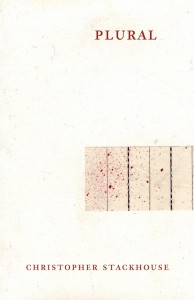 Plural
Plural
by Christopher Stackhouse
Counterpath, Nov 2012
64 pages / $14 Buy from SPD or Amazon
It wouldn’t be wrong to call the poems in Plural slippery: content just eludes you, as does the floor plan of a consistent or memorable form. Stackhouse has a playful but terse and lateral style that leads you to wonder why most poems start or stop where they do or aren’t combined. Two careful reads didn’t reveal many clues for the reader so, like I mentioned, while the book is interesting in synopsis form the individual poems stay slippery, just out of reach.
And to present the book in synopsis form: Plural incorporates poems in the same tone but different formatting strategies, notes from art world lectures that are interestingly similar to the poems, and a movement across the course of the book from being concerned with the mind and consciousness to reveling in the body. The lecture notes are actually some of the most interesting parts of the book because not only do they give the surrounding poems context, they serve as a map for Stackhouse’s cognition. And although the notes are about primarily visual art, a lot of what Stackhouse notes bleeds into not just his writing but the idea of writing, as in “Notes from Panel Disc. @ The Fish Tank Gallery”:
The artist takes a position based on how s/he sees itself in
contextual dialogue (art historical?) with the human condition.
The artist interprets his/her world to create meaning, or/and,
comment on the way meaning may be transmitted.
Those last two lines are important as applied to Stackhouse’s mostly brief poems, which seem more concerned with transmitting meaning than creating it and lack much broader context other than being in the same book. This is not a bad thing; if you’re looking for lots of meaning consult your local public library for probably a few dozen books of free verse heavily into creating meaning, for what it’s worth. But the poems arrive with the same matter-of-fact record-keeping as the lecture notes, which can render them frustrating at times not because you’re desperately searching for meaning but because you’re wondering, given the consistency, “why X and not Y?”
An example of the bulk of the book follows, from a poem about midway through titled “Chew the Candy”:
from a crack in the concrete laid in an alley brutal
but potential for a lawn. Lounge there easy.
Find the line and then straddle it. Stroke the pole.
Probe the hole. Be comfortable in all that is not
there.
What you see there is mostly what you get, save for the lecture notes and a brief prose vignette Stackhouse and/or the narrator shares about daydreaming, while buying a beer from a corner store, about watching porn online. The piece is worth bringing up because it stands in pretty stark contrast to the cerebral notes excerpted above but serves as a kind of landing point for a book that jumps vaguely from the mind to the body over the course of the book. And by vaguely I mean it’s never clear exactly where this shift in interest occurs because of the poems’ relative opacity but more importantly what doesn’t get even hinted at is why the book shifts this way. It’s an interesting move, but one that just sort of happens and doesn’t add much of a layer to the poems it includes. The book moves from
as you make the mark you become the image
of an image making a mark––remaining
all the way over to
where was once murder, pairs of lovely legs
made love (yes love again and to come) in the grass.
You could say this contradicts my mention above of a certain tonal sameness, but even across a variety of forms and concerns Stackhouse’s diction remains detached, intelligent, clinical, always in the moment just before “making the mark.” And it’s amateur to expect a poet with a given house style to really mix it up in a book that weighs in at barely over fifty pages, but it’s less that there could be more variety than that the detachment gets in the way of making the book pleasurable enough to have much to hang onto or want to revisit.
So, again, it’s not that the book is bad, or that it fails at whatever aims it might have, it’s just that the slack detachment of the poems plus their frequent opacity leaves you lacking for a little bit more, either something more at stake or more coherent or even just simply more fun. As it is, the book is an unfolding of the lecture notes it includes: unfinished thoughts about a subject mostly obscured from view.
***
Nicholas Grider is the author of the forthcoming short story collection Misadventure (A Strange Object, 2014).
Tags: Christopher Stackhouse, counterpath, nicholas grider, Plural
